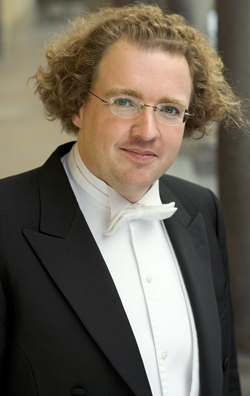French conductor Stéphane Denève scores a triumph in Chicago Symphony debut
 Review: Chicago Symphony Orchestra. Stéphane Denève, conductor; Leonidas Kavakos, violin. At Orchestra Hall through Nov. 12 *****
Review: Chicago Symphony Orchestra. Stéphane Denève, conductor; Leonidas Kavakos, violin. At Orchestra Hall through Nov. 12 *****
By Lawrence B. Johnson
The French conductor Stéphane Denève made thrilling debut with the Chicago Symphony Orchestra on Thursday night. It came as no surprise to me. I first encountered Denève a few years back at the Festival of the Sun in Cortona, Italy, where he’s become a regular guest with the festival’s summer ensemble. I was quite taken by the Frenchman then, but what he and the CSO delivered together, in a program of French and Russian music, was of a different order.
 In his fledgling years, Denève, who turns 40 this month, served as assistant to Sir Georg Solti with the Orchestre de Paris. This season he winds up his first directorship, with Scottish National Orchestra. He’s already into his first year as chief conductor of the Stuttgart Radio Orchestra. He is going to be an international force, and his concert with the CSO amply demonstrated why.
In his fledgling years, Denève, who turns 40 this month, served as assistant to Sir Georg Solti with the Orchestre de Paris. This season he winds up his first directorship, with Scottish National Orchestra. He’s already into his first year as chief conductor of the Stuttgart Radio Orchestra. He is going to be an international force, and his concert with the CSO amply demonstrated why.
Had Denève brought an all-French program to Chicago, one might have said, well, yes but what else can he do? I’ll get to his French offerings – the suite from Roussel’s 1912 ballet “The Spider’s Feast” and Ravel’s Suite No. 2 from “Daphnis et Chloé,” both breathtakingly beautiful – but those came only after performances of two works by Prokofiev that might have left one convinced the conductor was Russian born.
Denève opened his concert with the familiar suite from Prokofiev’s 1921 opera (created for the old Chicago Opera) “The Love for Three Oranges.” Except there was nothing familiar about it, least of all where the popular march was concerned. Denève utterly revivified this music that probably every listener in Orchestra Hall could hum. Suddenly the petite march took on a jaunty mischievousness, couched in spiky rhythms and surrounded by subversive voices of woodwinds and brasses that typically don’t even reveal their bristling little heads. And so it went for the whole seven-movement suite, notably in a bumptious evocation of magical spirits whose irregular pulse and brash harmonies showed Prokofiev for that authentic modernist that he was.
Throughout the suite, Denève conducted with a precision and clarity that lent the music not only freshness but also a seeming weightlessness. And this was true as well of his collaboration with violinist Leonidas Kavakos in Prokofiev’s Violin Concerto No. 2 in G minor (1935). The concerto, fraught with Prokofiev’s typical excursions into irony and laced with his acerbic harmonies, is pure chamber music with the violin as first among equals.
Kavakos indeed might as well have taken a seat among this colleagues, so self-effacing and integrated was his eloquent and responsive performance. From his 1724 Stradivarius he drew a sound of deep luster and distilled intensity as violinist and orchestra spun their many threads into whole cloth of stunning detail and refinement. If Kavakos displayed virtuosity in its most subtle form, Denève matched his art and his imagination in shaping the CSO’s pinpoint interplay.
The violinist answered a warm ovation with another dazzling display of understatement, a gossamer flight through Francisco Tarrega’s “Recuerdos de la Alhambra,” a romantic tremolo study for guitar that Kavakos translated to the violin with shimmering effect.
Then came the French music. Can you say ooh-la-la? Denève began with Roussel’s “Spider’s Feast,” which hadn’t been played in a CSO concert since another Frenchman, Jean Martinon, conducted it in 1965. In brief, the ballet might be described as a picnic for crawly creatures that find out what it’s like to be harassed by tiny uninvited guests. In other words, a sort of pastorale under a microscope. Roussel’s ravishing music, cast in vaguely impressionist style, applies a balletic grace to the creeping and flitting of insects with a disarming sense of color as well as movement. Deneve and the CSO made enchanting work of it all.
But the pièce de résistance was a sumptuous turn through Ravel’s “Daphnis et Chloé.” Here, in rippling woodwinds and swooping, gorgeously resonant strings, was the CSO at full throttle, though Denève kept this amazing wash of sound under exquisite control. The music’s final, ecstatic sweep – which the addition of brasses now brought to a blaze – lifted the house into roaring approval. And surely unadulterated, childlike delight.
Related Links:
- More about Stéphane Denève: Go to the conductor’s web page
- Denève recorded Prokoviev’s opera “The Love for Three Oranges” with the Netherlands Opera in 2005: Find it here
Photo credits: Top, Drew Farrell; left, J. Henry Fair
Tags: Chicago Symphony Orchestra, Leonidas Kavakos, Prokofiev, Ravel, Stéphane Denève


No Comment »
2 Pingbacks »
[…] Denève, who made an impressive podium debut last week (see here, here, and here), had expressed an interest in the history of the CSO, and one of my colleagues suggested a visit […]
[…] Denève, who made an impressive podium debut last week (see here, here, and here), had expressed an interest in the history of the CSO, and one of my colleagues suggested a visit […]